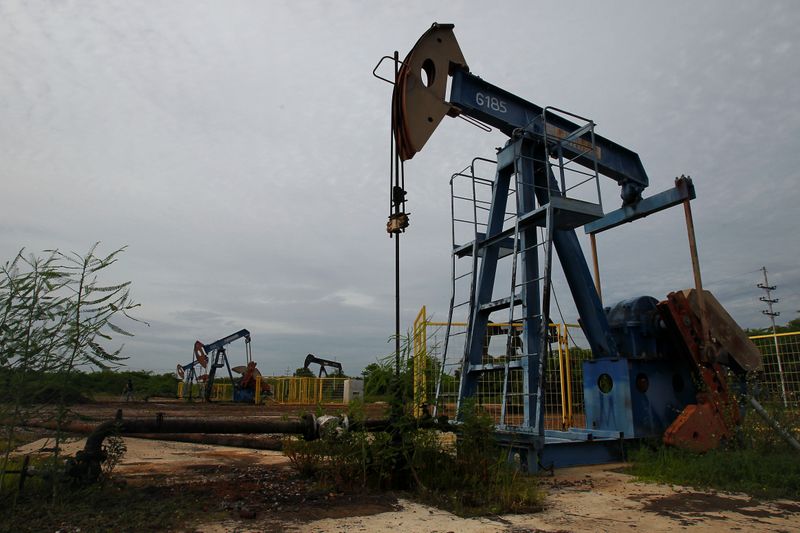By Luc Cohen
(Reuters) - Representatives of fuel suppliers to Venezuela, importers of Venezuelan oil and advocacy groups said this month they plan to press the incoming administration of U.S. President-elect Joe Biden to reverse a ban on crude-for-diesel swaps.
The Trump administration since the last quarter of 2020 has barred companies from sending Venezuela diesel in exchange for crude. Those deals were exempted for more than a year from sanctions on state oil company Petroleos de Venezuela SA, aimed at ousting President Nicolas Maduro, who has overseen an economic collapse.
That has prompted concerns about the humanitarian impact of a possible deficit of diesel, widely used in Venezuelan public transportation, agriculture, and as fuel for generators used as a backstop for frequent blackouts. Farmers are already warning that shortages are impeding sugar harvesting and rice planting.
A more acute scarcity of diesel would add to widespread gasoline shortages in Venezuela, as domestic refineries are working at a fraction of their installed capacity. Washington has not authorized PDVSA's customers to supply the crisis-stricken OPEC nation with gasoline for over a year.
"Public transit uses a lot of diesel," said Feliciano Reyna, president of Caracas-based aid group Accion Solidaria focusing on HIV/AIDS treatment and other medical relief activities.
"We hope that the incoming Biden administration can take a more strategic look at the purpose of the sanctions, and can lift those that don't change the position of the group in power and instead create problems for the population," Reyna said.
A spokesperson for Biden, who takes office on Jan. 20, declined to comment. Biden has labeled Maduro a dictator, and advisers said he was likely to maintain some sanctions while seeking more consensus among U.S. allies about how to apply them.
Companies that frequently engaged in the swaps with U.S. government authorization include India's Reliance Industries Ltd, Spain's Repsol (OTC:REPYY) SA, and Italy's Eni SpA. The permits allowed the firms to refine Venezuelan crude in exchange for diesel even amid sanctions.
A person close to Reliance said the company had sent Biden allies briefing materials on the potential humanitarian fallout of the ban on diesel swaps in the hopes the new administration would reinstate the exemption.
"Our objective is, do it on Day 1," said the person, who spoke on the condition of anonymity. The person added that the Trump administration in November turned down a request from the company to participate in a swap offered by PDVSA that would have let the firm import Venezuelan crude in exchange for diesel.
Reliance did not respond to a request for comment.
A Repsol spokesman said the company "is in constant dialogue with the authorities in Venezuela and the U.S. to ensure that the company remains compliant," and said the company would "continue its engagement with the incoming Biden administration." An Eni spokesman said it was "premature" to comment on the issue.
CONTINUED CUBA EXPORTS
Internal PDVSA documents seen by Reuters show Venezuela has not received imports of diesel since November, and consultancy Gas Energy Latin America warns the country's diesel inventories could run out by March or April. Venezuela is now heavily dependent on Iran for fuel imports, especially gasoline.
A person close to PDVSA's Paraguana refining complex said its two main plants are together producing around 30,000 barrels of diesel per day; Gas Energy estimates consumption ranged from 42,000 to 59,000 barrels per day (bpd) in 2020.
PDVSA's 1.3 million bpd refining network is operating at minimal capacity after years of underinvestment and mismanagement, while PDVSA has continued to export some diesel to Venezuela's political ally Cuba under a long-term supply agreement.
PDVSA's diesel shipments to Cuba averaged around 4,000 bpd in the final three months of the year, a small fraction of the total 75,000 bpd it sent the island during that time period, internal PDVSA documents show.
Elliott Abrams, the U.S. State Department's Special Representative for Venezuela, has pointed to those shipments as a sign "the regime feels its supplies are sufficient."
Neither PDVSA nor Venezuela's information or oil ministries responded to requests for comment.
Neither the State Department nor the Treasury Department, which enforces sanctions, responded to requests for comment.
The Washington Office on Latin America (WOLA), a rights group, sent Biden's transition team a policy memo recommending his administration re-establish the crude-for-diesel swaps.

"Even if Maduro stops sending anything to Cuba, it is a question of months before the country runs out of diesel," said Geoff Ramsey, WOLA's Venezuela director. "The people that are going to be most affected by that are the population."